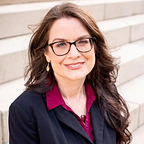Who Are You and What Do You Do?
A year ago, the idea I would ever involve myself in baking was laughable. My kitchen is small and not modernized. The oven is old and heats unevenly, as evidenced by the frozen pizzas that burn on one half while the other half is underdone. Most importantly, I felt, baking isn’t something that I do. It’s for other people, not me.
After leaving teaching to start my own business, I began working in a bakery making breads, cookies, and pies, and I learned tips and tricks from some of the long-time bakers. For the first time, I found myself googling bread recipes. I began experimenting with jalapeno cheese bread and garlic parmesan roll knots. I broke through this limitation that I seem to have arbitrarily imposed on myself- the idea that “I am not a baker” and “I don’t know what I’m doing in the kitchen.” I discovered that it wasn’t that I didn’t want to bake, but rather that I couldn’t conceive of myself as a baker. It wasn’t something that I did.
I eventually made sourdough starter, a two-week process of using wild yeast that exists on flour to create an effective leavening agent. It required twice-a-day messy “feedings” and a lot of patience. I gummed things up with dough, and I splattered the sink with doughy water. I dropped flour all over the floor and spilled water on the counter trying to measure by weight instead of volume. Despite what I perceived as very slim odds in my favor, the starter matured.
I dived right into sourdough bread baking making an entirely wild yeast-leavened bread, rustic-style. Sourdough rises slowly and requires extra time to achieve the same amount of rise that powdered yeast does. Many sourdough recipes recommend using a combination of starter and powdered yeast to speed up the rise.
Not including preparation time (mixing, kneading, etc.), the dough rose for a total of five hours, involving a somewhat elaborate process of kneading, punching down, folding, and shaping. I had no idea how this would turn out except that I expected the worst — a ton of effort to produce an abject failure. Instead, I made the best bread I have ever tasted.
My hard work paid off, and I was pleasantly surprised. I had working, living sourdough starter that actually functioned properly. I tried something new completely outside of my comfort zone and despite my misgivings, I persevered and my efforts were rewarded.
This is exactly how I think about writing. People psych themselves out and convince themselves that they have no ideas or they can’t write or they aren’t “a writer.” The truth is that everyone has ideas and everyone has unique ways of expressing those ideas. To be a writer, you just have to write, and to finish a project, you may have to change the way you think about yourself and your work.
Community can help, too. I believe I wouldn’t have pursued baking if I hadn’t had a network of bakers who shared their expertise with me and encouraged me to give this bread-baking at home thing a try. Depending on the type of writing you want to do, fellow writers can help you flesh out ideas, talk you through writer’s block, and edit existing writing. If you can’t find a community, a mentor — either online or in person — can be helpful.
Regardless of how you think about yourself and your work, you will be a more productive and a more content writer if you do what I did before baking my sourdough masterpiece — put aside the self-imposed limitations of who you are, what you do, and what you can accomplish.
